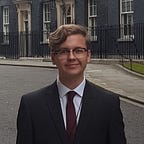The Five Books I Read This Month
I love reading and I always have since I was a little boy. A good book has the ability to enchant the mind, body, and soul and rescue you from the mundane with an adventure to the magical. Through writing, we walk in the shoes of those who are different from us, and we see the world through the prism of their perspective. The ability to read itself is a privilege, as is the wealth of accessibility and resources that many of us enjoy. That’s why I’ve been disappointed that since I left school I haven’t devoted as much time as I would have liked to.
I’m not particularly sure why but over the last month that has changed. Perhaps as a form of escapism and entertainment from the monotonous routine that accompanies my online studies. The fact that most of the books I read this month are not fictional tells me that maybe I’m trying to understand the ever-changing world we find ourselves in.
Whatever the reason may be, in an effort to keep the habit going I’ve decided to share my thoughts on the books I have read this month. Hopefully, if you find the time you might like to read one of them yourself.
#1: “Where The Light Enters” by Dr. Jill Biden. (2019)
Dr. Biden demonstrates her literary prowess honed through a decades-long career of teaching English. The First Lady has an incredible gift that makes this book read not like an autobiography but the articulated storytelling of a loving family woman and the cherished memories that make her a Biden.
Dr. Biden tugs at the strings of your heart with her candid recollection of her son Beau’s struggle with cancer, her tales of a fulfilling marriage, and I greatly appreciated her hilarious stories (Which included her hiding in a luggage shelf on Air Force Two to scare her husband).
Where The Light Enters is essential reading for anyone who wants to understand the character of the Biden family and the life of the world’s most powerful couple.
#2 “Promise Me, Dad: A Year of Hope, Hardship, and Purpose” by Joe Biden. (2017)
President Biden’s book is a brave account of the roles he considers most important in his life: being a father and a politician. It is a chronicle of a life marked by astounding peaks and unimaginably painful lows. In a year where many of us have lost loved ones, I felt grateful to be allowed into the grieving process of an important leader. If you want to understand the character of the most powerful man in the world then this book will help you understand the things that are most important to him: family and faith.
Biden’s writing doesn’t quite live up to the gold standard of his wife’s but he accounts for this with enthralling tales from his incredible half-century-long career in politics. From standing in the Kremlin and telling President Putin he has no soul, to intimate stories from the annual Biden trip to Nantucket this book is a testament to the resilience and fortitude of a man we should all take some time to learn about.
#3: “The Twittering Machine” by Richard Seymour. (2019)
I was born in the year 2000, which means I am part of the first generation to grow up with a smartphone. When I got my first Blackberry at the age of 11 it became my own piece of Eden and marked the beginning of an increasingly tightening grip of social media on my life.
Seymour’s polemic invites you to evaluate your relationship with social media. Seymour likens the “social industry” to a painting by Paul Klee, in which a row of predators “squawk discordantly”, enticing victims into their death. Though sometimes his prose can lean on hyperbole, his horror story is well-evidenced as he highlights the tangible impacts of social media on teenager’s mental health, polarisation, and society.
If you are interested in this topic, I would recommend watching “The Social Dilemma” on Netflix for an overview.
#4 “How to Avoid a Climate Disaster” by Bill Gates. (2021)
Solving climate change will define the legacy of my generation, and if we fail to meet the task at hand then I know my grandchildren will condemn us for it. Bill Gates draws on his wealth of technical knowledge and experience to detail pragmatic solutions to the challenges of reaching net zero.
Gates recognizes the urgency of the moment and the clear intersectionality of the climate crisis and the challenge of ending poverty. He champions the value of science over the circus of politics when it comes to the issue by evidencing his proposals with visual data. This book actually only came out yesterday but Gates’ easy-going but intelligent style of writing assures me that I will finish it quickly.
#5 “Trust: America’s Best Chance” by Pete Buttigieg. (2020)
Secretary Buttigieg has written one of the most important books I have read in a long time. Intricately constructed from pragmatism, rigorous study, and the anticipation of counter-argument “Trust” is an easy read that highlights the important role the subject plays in our daily lives and politics.
Buttigieg draws on his military service in Afghanistan and his historic 2020 presidential campaign to craft a well-evidenced, compelling case that trust is the most pressing deficit in resolving some of the great challenges of the decade ahead. I was grateful that Buttgieg also included a Pew Research Center report entitled “Trust and Distrust in America” from which he wove together his characteristic clarity with well-represented data. This book has convinced me that we all have a role to play when it comes to restoring trust in our institutions and that work precedes any significant progress we can make on the serious challenges of the century.
